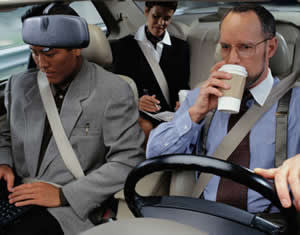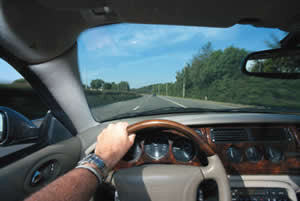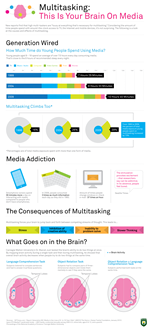Stress, Multitasking and Attention Span
I've never been a fan of multitasking from a stress management perspective and as the result of reading an interesting article in Scientific American Mind Magazine on multitasking a few weeks ago, I've decided that my feeling about multitasking have been confirmed. "Effective multitasking is a myth. So, too, is the idea that members of the 'multitasking generation,' who grew up with video games, smart phones and e-readers, can somehow concentrate on several things at once. In fact, research indicates that frequent multitaskers are often the worst at it."
 My feeling is that when we try to do too many things at once, we often fail badly at one of those things, and usually feel VERY stressed as the result. While there's always the chance that everything will go well, when you divide your attention among several things at once, usually this very process is stressful and the stress only resolves itself if you complete all the tasks successfully. But your risks, as can be shown by the serious nature of automobile accidents that have been the result of distracted driving, (i.e., looking down at your cell phone when you should be looking at the road) can involve the death of a pedestrian, a passenger or even you.
My feeling is that when we try to do too many things at once, we often fail badly at one of those things, and usually feel VERY stressed as the result. While there's always the chance that everything will go well, when you divide your attention among several things at once, usually this very process is stressful and the stress only resolves itself if you complete all the tasks successfully. But your risks, as can be shown by the serious nature of automobile accidents that have been the result of distracted driving, (i.e., looking down at your cell phone when you should be looking at the road) can involve the death of a pedestrian, a passenger or even you.
One of the points that comes through loud and clear in the article is that whether you talk hands free or not, you're still dangerously dividing your attention just by using your cell phone. The article makes the very interesting point, that if you were talking to a passenger in the car, that person would probably stop talking or even warn you if the traffic got heavy or something or someone darted out into the middle of the road. The person on the other end of your cell phone is entirely clueless to your traffic conditions and may not even know you are driving.
 One of the most startling pieces of information in the article - at least for me anyway - was that attention is finite. We only have a limited amount of attention to go around at any given moment. "Attention is limited in capacity and can be flexibly allocated among concurrent tasks. By this theory, however, devoting more attention to one activity, necessarily implies taking it away from others."
One of the most startling pieces of information in the article - at least for me anyway - was that attention is finite. We only have a limited amount of attention to go around at any given moment. "Attention is limited in capacity and can be flexibly allocated among concurrent tasks. By this theory, however, devoting more attention to one activity, necessarily implies taking it away from others."
In fact most of us split our attention among several different things at once without even realizing it. The best place to see this first hand is when you're driving -and NOT talking on the phone. In addition to driving you are probably listening to music on the radio, maybe talking with a passenger in the car, maybe sipping on a coffee and perhaps even eating a donut. Your attention is ALWAYS going to be divided up between these many different things. Yes you can do them all at once, but no one thing is going to get your full attention all the time. If you're paying too much attention to the conversation, and reach down for the coffee at the precise moment a child runs out into the street, heaven help you and the child.
 It's really simultaneously amazing and scary how we can divide our attention this way. But we only have a set amount of attention to give at any given moment. What we do instead is parcel out so much attention to this and so much attention to that. So in point of fact one activity gets a certain percentage of your attention while another gets more, depending on the tasks involved and difficulty of doing them with moderate attention.
It's really simultaneously amazing and scary how we can divide our attention this way. But we only have a set amount of attention to give at any given moment. What we do instead is parcel out so much attention to this and so much attention to that. So in point of fact one activity gets a certain percentage of your attention while another gets more, depending on the tasks involved and difficulty of doing them with moderate attention.
When I sit at the computer, and my printer is printing up a long document, and my DVD printer is printing up a batch of DVDs and maybe I've got a load of laundry in the washer and a load in the dryer, I feel like I am multitasking and I am. But in this case, I'm not dividing up my attention amongst these things. In this example, I started each machine with full attention, one machine at a time, and then they take over after that, turning themselves on and off, through different cycles and doing whatever is required as the need arises.
But when I'm driving I'm truly splitting my attention among several tasks at one time. I was taking my daughter on a college scouting trip to North Carolina and we had mapquested the directions. During the trip there was a 300 mile stretch down route 81 in Virginia where we were on one highway for the whole time, it was pretty straight and the traffic was light. So it was easy to drive with a low percentage of my attention on the driving itself, and a greater amount of my attention on listening and talking with my daughter. We had music on in the background as well. When a really good song came on, we'd both stop talking and pay full attention to the song, with some of my attention going to watching the road. But if someone entered on to the highway or cut in front of me, instantly my attention would be totally on the road. (I noticed, I wouldn't even hear the song, or even feel the need to turn down the radio, if the traffic got suddenly congested.)
 Whenever we'd come to a place in the road where we'd have to watch out for a highway sign, we'd naturally stop talking and BOTH look for the sign while she'd hold the directions in her hand. More recently I was driving to the Y while listening to a recorded book. When a school bus pulled in front of me, with a police car in back of it, my attention was glued to the bus and the police car for the entire time they were in front of me. When they pulled down another street, I noticed that I had completely missed EVERYTHING the author of the book had said since the bus pulled in front of me, so I had to rewind. It wasn't just I didn't pay attention, I actually didn't hear a single word of it, my attention was so glued to the police car and the school bus. (I was able to find the exact spot on the CD where I had stopped paying attention, too.)
Whenever we'd come to a place in the road where we'd have to watch out for a highway sign, we'd naturally stop talking and BOTH look for the sign while she'd hold the directions in her hand. More recently I was driving to the Y while listening to a recorded book. When a school bus pulled in front of me, with a police car in back of it, my attention was glued to the bus and the police car for the entire time they were in front of me. When they pulled down another street, I noticed that I had completely missed EVERYTHING the author of the book had said since the bus pulled in front of me, so I had to rewind. It wasn't just I didn't pay attention, I actually didn't hear a single word of it, my attention was so glued to the police car and the school bus. (I was able to find the exact spot on the CD where I had stopped paying attention, too.)
 In yoga practice this is called sense withdrawal, and is something you learn to do to enhance meditation. We all do this from time to time, when we suddenly notice a clock ticking in a room when we hadn't noticed it before. Here again we have given all our allotted attention to some other task, and when we finish, suddenly we start to notice other things in the room.
In yoga practice this is called sense withdrawal, and is something you learn to do to enhance meditation. We all do this from time to time, when we suddenly notice a clock ticking in a room when we hadn't noticed it before. Here again we have given all our allotted attention to some other task, and when we finish, suddenly we start to notice other things in the room.
When we use this power of sense withdrawal while we are focusing on something interesting at work this is known as flow. A state of flow is when you are so carried away by what you're working on that all other thoughts drift away. You lose track of time and you become lost in your work. That happens to me when I'm writing sometimes, and it's very satisfying. (I noticed it too, just now as I've been re-reading the final edit of this article, after having put it aside for about a month, and it's really HOLDING my attention fully.) Here again my attention is mindfully focused on doing one thing, and that leaves me feeling relaxed and deeply satisfied at the completion of the task.
So the main reason I'm not a fan of multitasking, including the very mildly attention-splitting activity of listening to music during a yoga class, is because attending to one thing, and only one thing at a time is deeply satisfying and very relaxing. When I used to travel long distances in the car by myself, I felt like I had to have dozens of CDs (usually recorded books) in order to make it to my destination without dying of boredom. Now, especially if it's a scenic drive, I listen to nothing and just take the whole experience in, trying not to let my mind wander off, on some mental multi-task.
 But don't get me wrong, I still multi-task when I have to and sometimes even when I don't. It's a hard habit to break. But I also see the innate pleasure of doing one thing and one thing only. When I'm eating lunch with a friend, and the cell phone rings, I don't even look at it. When I'm talking to a bank teller and doing some other simple transaction with a cashier or clerk, I NEVER try to simultaneously talk on my cell phone in order to achieve some greater "perceived" level of efficiency. But when I'm driving on the highway, and there's not too much traffic and I can safely SPLIT my attention between the cell phone and the traffic with a hands free phone, yes I will multi-task.
But don't get me wrong, I still multi-task when I have to and sometimes even when I don't. It's a hard habit to break. But I also see the innate pleasure of doing one thing and one thing only. When I'm eating lunch with a friend, and the cell phone rings, I don't even look at it. When I'm talking to a bank teller and doing some other simple transaction with a cashier or clerk, I NEVER try to simultaneously talk on my cell phone in order to achieve some greater "perceived" level of efficiency. But when I'm driving on the highway, and there's not too much traffic and I can safely SPLIT my attention between the cell phone and the traffic with a hands free phone, yes I will multi-task.
I remember seeing a woman I knew at a skating rink, who was ostensibly watching her daughter skate, while she was lying down on a bench reading a newspaper, while she was raising and lower her legs for exercise while she was listening to music on her iPhone. Most people who mulit-task like this are wanting to distract themselves (from their own pain and stress) and I believe this was true in her case. But this level of multitasking, really just makes us more anxious and more tense, as I believe, on some level, all multitasking does. Attending to things with our full attention, however, leads to flow and peace of mind while inattention leads to accidents and hurt feelings. There are so many benefits to be gained from focusing our attention on one thing and one thing only, you would think that people would WANT to do this all the time. But unfortunately they don't.
Most people are like my friend at the skating rink dividing their attention amongst many things while thinking they are being more efficient.





James Porter
Author